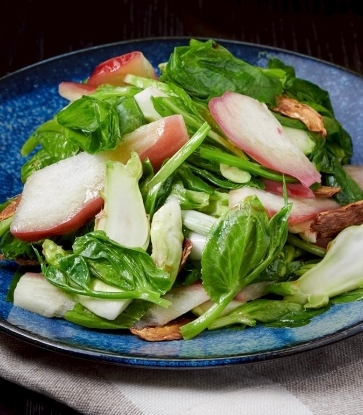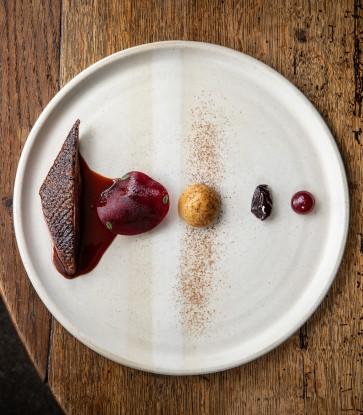These days, more restaurants and chefs are proving that cooking at a high level, both sustainably and deliciously, is not mutually exclusive, and that the two ideals can also come together to make the experience at the table even more complete.
These are such restaurants and chefs that the MICHELIN Green Star has been created to highlight and commend. First launched in France in January 2020, the Green Star is awarded to restaurants in the MICHELIN Guide selections that are at the forefront when it comes to commendable practices in sustainability.

The MICHELIN Guide Taipei & Taichung 2021 was released on August 25 with two restaurants awarded MICHELIN Green Stars for the first time: Mountain and Sea House, which retained its MICHELIN star, as well as Yangming Spring (Shilin) which debuted in the Guide with a MICHELIN Plate distinction.

MOUNTAIN AND SEA HOUSE
One MICHELIN Star & MICHELIN Green Star
MICHELIN Guide Taipei & Taichung 2021
"Receiving the MICHELIN Green Star is an acknowledgement of our heart for the produce that we source. It means that our past ten years of hard work has been seen, and this makes us very happy,” shares executive chef Leo Tsai. At its core, the cuisine philosophy of Mountain and Sea House revolves around the belief that the most delicious flavours are always cultivated in the ground from natural ingredients.
To that end, the chef takes the utmost care to source the restaurant’s ingredients from farmers and suppliers that are environmentally friendly and cultivate their crops in the most natural ways. For vegetables, this may include producers that avoid the use of chemical pesticides, and instead relying on other animals and microorganisms in natural compost to keep pests away. For meat or dairy, this would include humanely raised cattle or free-range chickens that are reared with no added hormones or over-feeding to fast-track their growth.

CEO of Yuen Foong Yu Biotech Co., Ltd. that owns Mountain and Sea House, Stephanie Ho expresses that the organisation has always believed that sustainability can be integrated with the restaurant business, and hopes that through their efforts, they are able to present the beauty of Taiwan’s sustainable agriculture, seasonal produce and terroir and present it in an exquisite way through the artisanal, traditional Taiwanese cuisine at Mountain and Sea House.

Of course, making the ingredients the star of the show and insisting on only using the season’s best will always bring a certain level of challenge to designing a restaurant menu.
Now in its seventh year, the challenge is to continually create new surprises with the same seasonal ingredients, while at the same time having to constantly tweak the menu depending on the availability of these naturally grown produce, explains the chef. For example, a platter of steamed seasonal vegetables may feature dragon fruit flowers and bamboo shoots in the summer, but these become lotus root and chestnut for fall.

He is also particular about the size of the hens used in a traditional recipe for grilled chicken — they should weigh more than 2kg to achieve the best fat-to-meat ratio, a specification not easy to achieve for the farmers who have to take special care of the chickens’ growth rates.

When the restaurant launched its take-out meals, it carried over its attention to sustainability in its packaging materials by using as little packaging as possible and making use of reusable wooden boxes and fabric wrapping. "We will continue to think about how to implement more of such eco-friendly practices in the future, whether it is for dining-in or for take-out,” Ho says.
YANG MING SPRING (SHILIN)
MICHELIN Plate & MICHELIN Green Star
MICHELIN Guide Taipei & Taichung 2021
A fated conversation at a tea ceremony led the founder of Yangming Spring (Shilin) Chen Chien-Hung to the start of his vegetarian journey. Not only did he change his own lifestyle, he went and opened Yangming Spring (Shilin) in Yangmingshan, a restaurant that offered dishes very different from other vegetarian restaurants in the market at that time. "I wanted to apply what I learned over the years to highlight and enhance the taste of various produce so that people could truly taste the natural deliciousness of vegetables," he explained in his autobiography.

READ MORE: What the MICHELIN Inspectors Said About Yangming Spring (Shilin)

In spring 2019, Chen took things a step further by removing eggs and dairy from the menu and making it vegan. For example, the restaurant’s signature platter features a homemade beancurd made from non-GMO peanuts paired with a cranberry and chia seed beverage, cucumber-wrapped sweet peppers, organic tomatoes, soy sauce spheres made by molecular gastronomy techniques — all on a bed of plant-based cheese.

The eco-friendly features of Yangming Spring (Shilin) extend beyond the kitchen as well. Adjacent to the main dining room, the Ruoshui Tea Room overlooks a pond that is laid with bentonite instead of cement, preventing damage to the earth beneath it. Expansive floor-to-ceiling windows bring in natural sunlight into the restaurant and reduce the amount of electricity required to power the lights.
"Running a sustainable business is the practice of respecting the earth and the life that flows from it. Persevering to make every decision based on that principle is the promise of unifying thought and action," explains Chen.
READ MORE: The MICHELIN Guide Taipei & Taichung 2021 Vegetarian Restaurants

In recent years, the restaurant has also been the beacon for sustainability through outreach efforts in cooking classes, retail outlets, e-commerce, as well as overseas exchanges.
With the MICHELIN Green Star, Chen hopes the restaurant can be a greater force of good: “Receiving this award is a kind of honor and recognition, but it is also the beginning of greater responsibility.” Next, he hopes to drive a greener supply chain to the restaurant by supporting sustainable smallholder farmers and suppliers that engage in fair trade, thereby strengthening sustainable practices in the industry.
Banner image courtesy of Yangming Spring (Shilin)
This article was written by Hsieh Ming Ling and translated by Rachel Tan. You can read the original text here.




















